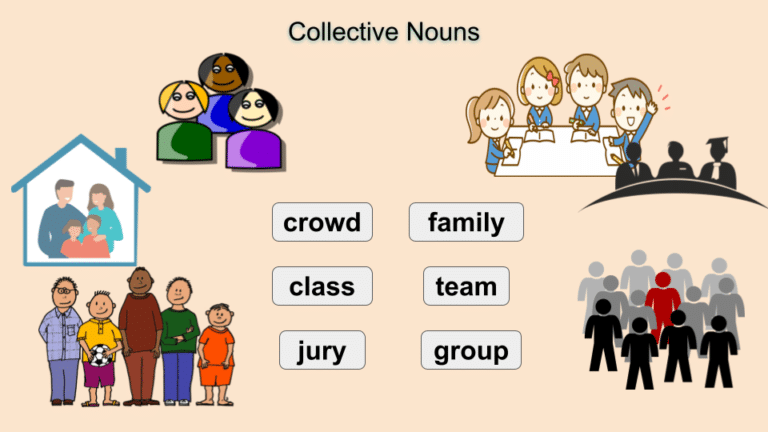
What are collective nouns?
A collective noun is a noun that denotes a group of members, such as family, group, team, staff, etc.
Collective nouns are usually studied in English grammar with reference to subject-verb agreement. Why? Because a word is singular in form, but it implies a plural meaning.
For example, the word “team” is singular in form, but a team always has at least two members, i.e. plural. So do we use singular or plural verbs with collective nouns? And do we use a plural or singular pronoun to refer to a collective noun? The answer to these questions is twofold.
When are singular verbs and singular pronouns used with collective nouns?
When we consider a collective noun as a single impersonal unit, a singular verb is used with it and a singular pronoun is used to refer to it
- This class is too small. It will be cancelled.
In this sentence, the class is perceived as one unit. That is why the singular verb is is used, and the singular pronoun it is used to refer to it.
When are plural verbs and plural pronouns used with collective nouns?
When we consider a collective noun as a collection of individuals, a plural verb is used with it and a plural pronoun is used to refer to it.
- The class are bringing different kinds of foods and drinks to the party. They are really helpful.
In this sentence, the class is perceived as a collection of individual students. That is why the plural verb are is used, and the plural pronoun they is used to refer to it.
Example sentences:
The following are examples of collective nouns used as singular and plural:
- My family is not happy here. It’s going to move to another city.
- My family is supportive. They offer me all the help I need.
- The government is planning to enforce the new rules next month.
- The government have different views of next year’s budget.
- The group was noisy. It was punished by the supervisor.
- The group are going to present their assigned tasks in front of the teacher.
- A huge audience attended the speech. It was larger than I had expected.
- The audience were chanting with joy.
- The team has an effective plan.
- The team have played a nice game.
- The plane’s crew is now complete.
- All the crew were saved.
- The jury has reached a verdict.
- The jury are still discussing the crime’s details.
More examples of collective nouns:
anthology
choir
committee
couple
crew
crowd
fleet
galaxy
government
group
heap
jury
party (political group)
public
regiment
staff
team
tribe
